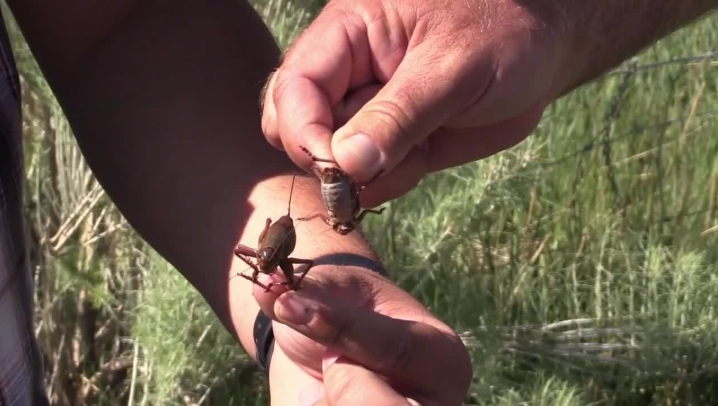This is the VOA Special English AGRICULTURE REPORT.
Mormon crickets and grasshoppers have invaded the American state of Utah. State officials say the attack this summer might be the worst since the Nineteen-Forties.
The insects have already attacked eight-hundred-thousand hectares of Utah farmland. Officials blame the Mormon crickets and grasshoppers for more than twenty-five million dollars in crop damage.
Utah Governor Mike Leavitt has declared an agricultural state of emergency. The state has asked for federal government assistance to control the problem.
Large insects have been a problem in Utah since the first Mormon settlers arrived more than one-hundred-fifty years ago. The most famous incident was in the spring of Eighteen-Forty-Eight.
The settlers are said to have pulled ropes across their wheat crops to force crickets off the plants. The crops were saved only when large numbers of birds began eating the insects.
Today, many parts of Utah are still largely undeveloped. Experts say this creates a good environment for Mormon crickets and grasshoppers. The insects attack small grain plants, cornfields and other vegetable crops. The insects compete with farm animals for food. They can remove leaves and protective bark from young trees and even some older trees. This can kill the tree.
Experts at Utah State University say that some female grasshoppers produce up to one-hundred eggs at a time. The insects leave their eggs in the soil during August, September and October.
The experts say some chemical products such as Dursban, Malathion or Sevin are effective weapons against grasshoppers. They say the best time to spray the pesticides is in the spring and early summer,soon after the young insects are first observed. When the insects become adults, it is more difficult to kill them with liquid sprays.
The experts say the removal of unwanted plants from open areas can help reduce the insect population. They also advise the plowing of open areas. Breaking up the soil forces the eggs out into the open. This causes the eggs to die.
Also, extreme winter weather and cold can destroy the eggs. So many Utah farmers this year are hoping for a cold and early winter.
This VOA Special English AGRICULTURE REPORT was written by George Grow.
